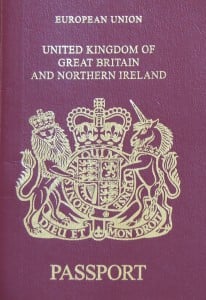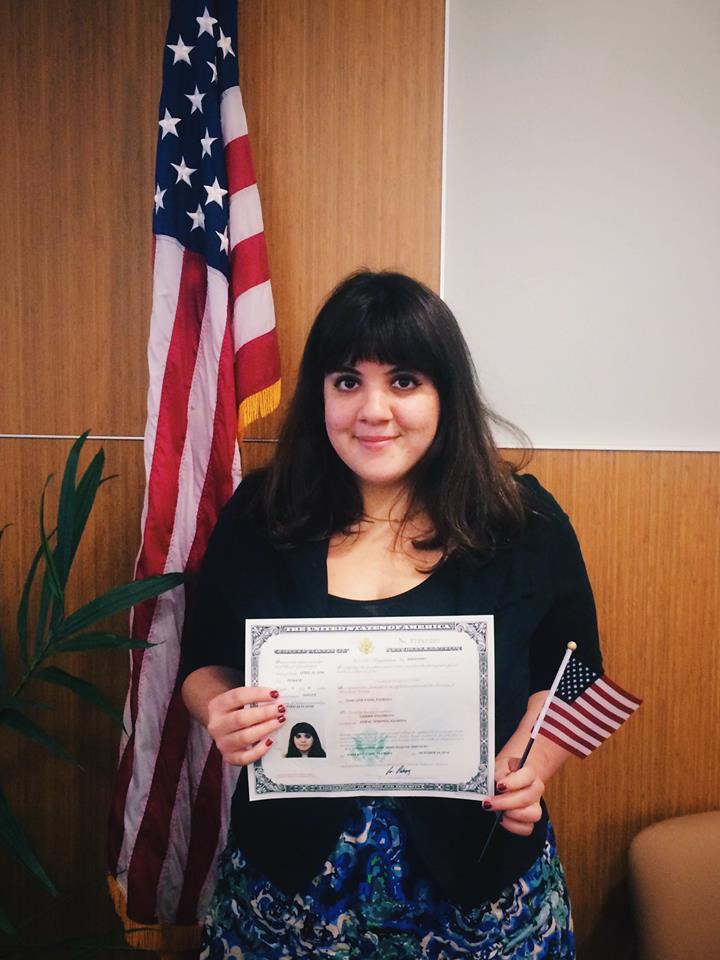Blog Archive
My Immigrant Story
Here are two stories about getting a government-issued I.D.:
1. Six years ago, I sat in the back office of the DMV in Deerfield Beach, Florida, for over an hour with the manager, trying to explain my situation. I needed official state identification in order to complete my immigration process. The only I.D. I had was from my college, which had my face and name, but no other information.
“That’s fine,” the manager of the DMV said, “just bring in your passport.”
 But I’ve never had a passport. I moved here from England when I was two years old on my mum’s original passport, which she had to surrender when it expired in order to get a new one. But look — here’s a dark, blurry, almost illegible photocopy of it where my name is half-visible, see? Perfectly placed right on the fold. That smudge is me.
But I’ve never had a passport. I moved here from England when I was two years old on my mum’s original passport, which she had to surrender when it expired in order to get a new one. But look — here’s a dark, blurry, almost illegible photocopy of it where my name is half-visible, see? Perfectly placed right on the fold. That smudge is me.
“Huh?” said the manager. We stared at each other some more. By this point in my citizenship status I had lost plenty of time inside identical bureaucratic offices. I was prepared to wait forever.
2. Three weeks ago, I sat in a similar chair at the mid-Manhattan branch of the New York Public Library. I had moved to New York recently, only two and a half months after my Naturalization ceremony, and still had my Florida driver’s license. But I wanted to get a New York I.D. for two reason: to register to vote and to get a library card.
The polite young man at the table in the library asked to see my license, and one proof of address, like a paystub or something. That was it. No, it’s free, don’t worry.
You mean you don’t need three different proofs of address? I wanted to cry. You don’t need a few grand in cashier’s checks? You don’t need to see several marriage licenses and passports that didn’t exist? You don’t need a cover letter and resume, work references, or my permanent record? You don’t want to know my blood type, my internet browser history? The promise of my first-born son? An offering to sacrifice to the Gods of Paperwork in return for a bountiful harvest and a piece of plastic with my picture on it?
“…just fill out this form and wait. Over there,” said the guy at the desk, handing me a single piece of paper.
The story of my generation — the so-called Millennials — is two-fold. We’re dichotomous that way. A tough job market and economy means we’re pretty used to sending out applications and forms into the wind then waiting months for any kind of response, if one comes at all. But the rapid pace in which technologies developed in our lifetime have also made us very comfortable with speed – we know how fast things have the potential to come and go, and we good with that.
So for immigrant Millennials, especially ones raised in the United States, and especially those going through the Naturalization process, we know very well things may take a very long time to happen, but that doesn’t mean we have to like it.
I’m not unaware of the privilege I experienced growing up compared to other undocumented immigrants, as a white girl from an English-speaking country. It was by and large an odd immigration experience. No one ever made any assumptions based on my language and accent (if anything, I endured the opposite. The sentiment of “You’re British? But why don’t you have a cool accent??” has plagued me my entire life). We were always pretty poor, and moved constantly to new apartment complexes in the same county. There was never a thriving British community in south Florida (or maybe anywhere in the U.S. for that matter), so knowledge of my cultural heritage was left entirely in the hands of my family and relatives, many of whom had lived here for years and were already very Americanized. As a kid, the only influences from my background were my father and grandfather yelling about Manchester United, watching Monty Python at far too young of an age, and being told repeatedly how superior English candy is to American candy. Which, by the way, is perhaps the cruelest thing one could say to a child, and was always met with the despairing whine from me and my siblings, “So why did we leave?”
Growing up, I didn’t feel like an immigrant. Being British was just a character quirk, an interesting fact to share about myself every first day of school. At the Tenement Museum, often the story gets told that immigrant children at the turn of the century were raised American by the school systems but kept to their heritage at home, and the same could be said for me. To this day, my parents never consider themselves American, and never encourage me or my siblings to do so. When I was a kid, contemplating my identity didn’t extend further than which Spice Girl I was most like and which Hogwarts house I belonged in (it was Ginger Spice and Gryffindor, by the way).
My national identity was divided, but the line between two Western cultures was easily blurred. The two obsessions from childhood I just mentioned, after all, are also English transplants.
Without much success, I know now my parents spent all those years quietly trying to gain legal status for us while I was happily reciting the Pledge of Allegiance. Frequent bad advice, worse lawyers, low funds, and lost paperwork made the possibility of having one uniform national identity, at least in the eyes of the law — far from my family’s reach.
Identification has been a delicate subject for me since reaching adulthood. Once I’d graduated high school, the only purpose a school I.D. really served me was getting discounts at the movie theater. I couldn’t drive until many years after I had turned 16. The most minor, though somehow the most overwhelmingly unfair of indignities, was the inability to buy myself a drink on my 21st birthday. The celebration came and went with a whimper, with nothing but schoolwork, tacos, and Star Trek reruns (not for nothing, but in retrospect, this now sounds like a great birthday.)
It was another year and half before I was able to buy that drink (while simultaneously juggling schoolwork and immigration bureaucracy), proudly using a green card as identification. It was another two years before I got an actual state I.D. It was another two years that included arguing with waiters and grocery store clerks that yes, it is a valid form of identification, it’s government issued, and my birthday is right there, and I would really like that piña colada please.
One main characteristic of my generation has been about establishing an identity. We are what we Tweet, what we Instagram, what we share on Facebook. I’ve probably deleted more selfies last month than ever existed of my parents at my age. While this development of a brand, so to speak, is often a very open and online endeavor, I don’t believe it exists solely in the public sphere (though of course that is a part of it). But the question of identity is one that plagues many teenagers and young adults. We are constantly wrestling with who we are socially, sexually, politically, economically, psychologically — and every output is in some way a reflection of that internal struggle.
The immigrant Millennial — or the Millennial immigrant — has another layer of identity to come to terms with: nationality. Can we wear two brands simultaneously, can the two blend, or must we eventually commit to only one of them? What do I identify with more – the shining plastic in my wallet or the smudged, crumpled photocopy?
- Post by Gemma Solomons, Marketing & Communications Coordinator at the Lower East Side Tenement Museum

